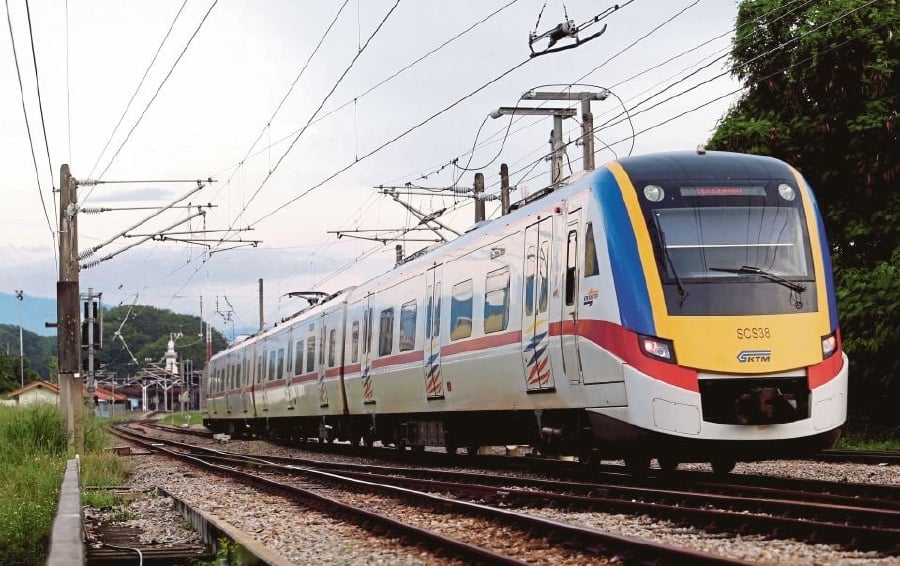By Sharen Kaur - August 22, 2024

KUALA LUMPUR: Loss-making Keretapi Tanah Melayu Bhd (KTMB) requires additional train sets to operate at full capacity and boost revenue, according to industry observers.
YS Chan, a tourism transport business consultant, said KTMB needs more trains to effectively cover the existing railway lines in Peninsular Malaysia and support the planned electric train service from Padang Besar to Johor Bahru by 2025.
"This is especially important as our roads and expressways become increasingly congested during rush hours and festive seasons, often doubling or tripling normal travel times," he told Business Times.
The Auditor General's Report 2018 Series 2 disclosed that KTMB's accumulated losses as of Dec 31, 2018 had reached RM2.83 billion.
The audit attributed the losses to several factors, including KTMB's lack of autonomy in decision-making, particularly concerning its operations and asset usage, as well as its heavy reliance on train ticket sales.
The state-owned railway company has been struggling financially, with over RM2 billion in liabilities, forcing it to depend heavily on government funding to sustain its operations.
According to a report by FMT last year, KTMB operated around 100 locomotives between 2000 and 2010, with 80 per cent in daily use.
However, more than 60 per cent of these locomotives are now out of service, it said, quoting the Railwaymen Union of Malaya (RUM) president Muhammad Faizal Shahibul Kiraya.
Malaysia has developed a plan to increase passenger train services nationwide from 2024 to 2030, to achieve 80 per cent railway track utilisation.
Transport Minister Anthony Loke Siew Fook said recently that although Malaysia had invested billions of ringgit in rail services, current utilisation stood at only 30 per cent.
Last week, Loke announced the acquisition of 62 new train sets for KTMB through a RM10.7 billion leasing agreement with China.
The amount will be paid in installments over a 30-year lease period, and the costs will cover maintenance, repair, and operational services provided by the train suppliers,
Loke hoped that the initiative would improve the reliability of rail services and boost public transport usage while managing the financial aspects of procuring the train sets.
Chan praised the government's decision to lease new train sets from China rather than opting for an outright purchase, noting that this approach avoids the substantial capital outlay and maintenance costs associated with purchasing.
He said that adding 62 train sets to the existing 68 in operation could increase track utilisation from 30 per cent to 45 per cent.
Chan also pointed out the practicality of continuing with a proven supplier, as nearly 90 per cent of KTMB's current passenger trains are manufactured in China.
While acknowledging its consistent financial losses and the likelihood of continued deficits, Chan emphasised that KTMB provides an essential service that the government must maintain, a common practice worldwide.
"The return on investment in public transport is not measured by profitability but by its value as a social service," he added.
"For example, China built at high cost 45,000 km of high-speed rail from 2008 to 2023, not for immediate use but well into the future when costs will skyrocket, and also to propel the country and its people into a high-tech and futuristic world that embraces science and technology."
Chan also noted that unlike city-states like Singapore, where public transport is the primary mode of commuting, Malaysia has a culture where public transport is less popular.
Dr. Yeah Kim Leng, a professor of economics at Sunway University Business School, echoed these sentiments, saying that although KTMB and the urban bus transport system were currently loss-making, they provide essential services critical to the economy's functioning.
He said the social benefits of public transport far outweigh the financial costs, suggesting that the focus should be on operational efficiency, reliability, and connectivity to maximise utilisation and reduce road congestion.
Yeah also stressed the importance of balancing affordability with cost recovery to alleviate the financial burden on the government.
He pointed out the significant imbalance between private and public transport in Malaysia and called for urgent improvements in the efficiency, reliability, and connectivity of the public transport system.
He argued that leasing is the most cost-effective way to finance the substantial capital investments needed to modernise and upgrade both intra- and inter-city rail transport.
Dr. Ahmed Razman Abdul Latif, an associate professor at Putra Business School, supported the government's plan to acquire new trains for KTMB.
He attributed KTMB's financial challenges primarily to poor asset utilisation.
"With more trains, revenue will increase, and KTMB will achieve economies of scale, leading to a return on investment and eventually a move back into profitability," he said.
Ahmed Razman highlighted the need to encourage greater public transport use to reduce traffic congestion and environmental impact, noting that the number of cars in Malaysia has already surpassed the population.
He pointed out the practical limits of highway construction, especially in large cities like Kuala Lumpur, and suggested that as traffic worsens, people will naturally turn to alternative transportation.
Ahmed Razman added that leasing trains is preferable to purchasing them outright, as it avoids the heavy burden of debt commitments. Under the lease agreement, Malaysia's obligation is limited to the lease payments.
No comments:
Post a Comment